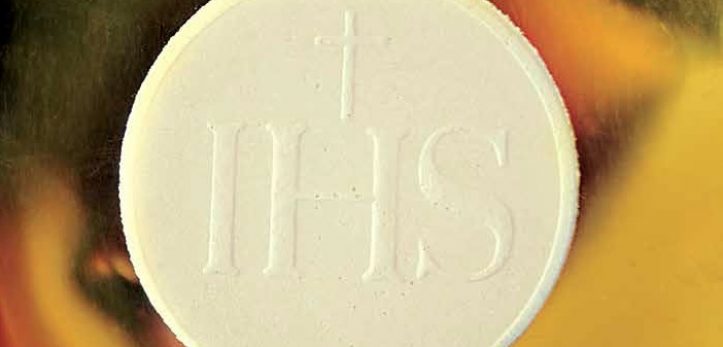I am the living bread (John 6:51)
Author: Fr. Mieczysław Piotrowski S.Chr.,
"Love One Another!" 40/2017
Faith

From the Gospel we learn that what provoked the greatest resistance, indignation, and scandal among His listeners was Jesus’ teaching about the Eucharist. (John 6:22-26)

In the synagogue of Capernaum
These words, which Jesus spoke to the Jews gathered at the synagogue in Capernaum, were shocking: “I am the living bread that came down from heaven. Whoever eats of this bread will live forever; and the bread that I will give for the life of the world is my flesh.” So the Jews quarreled among themselves saying “How can this man give us his flesh to eat?” So Jesus said to them, “Very truly, I tell you, unless you eat the flesh of the Son of Man and drink his blood, you have no life in you. Those who eat my flesh and drink my blood have eternal life, and I will raise them up on the last day; for my flesh is true food and my blood is true drink. Those who eat my flesh and drink my blood abide in me, and I in them” (John 6:51-56). For the Jews this was a shocking statement, and they responded “This teaching is difficult; who can accept it?” (John 6:61).
And then the Lord Jesus spoke the words that explain how one should understand the Eucharist: “Then what if you were to see the Son of Man ascending to where he was before? It is the spirit that gives life; the flesh is useless. The words that I have spoken to you are spirit and life” (John 6:62-63).
The Eucharist is not a symbol, but rather is the Risen Jesus Himself in His nonvisible, glorified humanity
By saying “Then what if you were to see the Son of Man ascending to where he was before?”, the Lord Jesus points to the mystery of the spiritual transformation and glorification of his humanity (body and blood) which will take place in His death, resurrection, and ascension. Jesus makes his disciples aware that only after His death and resurrection would they understand what He was telling them about His real presence in the Eucharistic form and about the necessity of eating His Body, and drinking His Blood. In another place Jesus said: “When you have lifted up the Son of Man, then you will realize that I am he” (John 8:28). That is to say, you will recognize my divinity. The lifting up indicates His crucifixion, as well as the transformation and glorification of His body in the resurrection and ascension.
We should remember that Jesus, as the true God (the Person of the Divine Word) becoming a true man, took upon Himself (in His true humanity) all the sins and sufferings of every person in human history. “He has borne our infirmities and carried our diseases” (Isa 53:4). Jesus experienced horrific suffering caused by the sins of all people, and truly died. But in the resurrection and ascension His dead flesh was glorified, and completely deified. As St. Paul writes, “in him the whole fullness of deity dwells bodily” (Col 2:9; comp. Col 1:19).
The risen Lord definitively defeated death and Satan, forgave all sins, and gave every person the chance for salvation. Ascending into heaven He concluded His visible presence on earth. Jesus’ “departure” in the Ascension was at the same time His arrival in the divine, omnipresent sense. St. Paul states that “He who descended is the same one who ascended far above all the heavens, so that he might fill all things” (Eph 4:10).
What happened to Jesus’ body in the Ascension?
In the Gospel we read: “So then the Lord Jesus, after he had spoken to them, was taken up into heaven and sat down at the right hand of God” (Mk 16:19). The phrase “sat down at the right hand of God” means that the Ascension is the final stage of the glorification of Jesus’ humanity, completing the process begun in His death and resurrection. The Biblical description of the Ascension (Acts 1:9-11) tells us about other characteristics of Jesus’ body before and after. In the Ascension, Jesus’ body became imperceptible to sight, and coalesced into the almighty Holy Trinity, thanks to which Jesus Christ in His glorified humanity is omnipresent and makes the Eucharist possible.
In the sacrament of the Eucharist Jesus gives us the perpetual possibility to take part in the mystery of his passion, death, and resurrection. By this means He wishes to give us His very self in His glorified humanity as true spiritual food and drink. He gives us His love and life so that we can take part in His ultimate victory over sin, death, Satan, and hell. The Eucharist is not a symbol, but rather is the Risen Jesus Himself in His nonvisible, glorified humanity, which gives us His very self, along with God the Father and the Holy Spirit, and thereby gives us full happiness.
”There are some among you who do not believe”
Towards the end of His discourse on the Eucharist Jesus said to His disciples: “»But among you there are some who do not believe.« For Jesus knew from the first who were the ones that did not believe, and who was the one that would betray him” (John 6:64). The apostle Judas did not believe what Jesus said about the Eucharist, and it was right there in the synagogue in Capernaum that he decided to betray Him. Finishing His oration on the Eucharist, the Lord Jesus said: “Did I not choose you, the twelve? Yet one of you is a devil” (John 6:70). And John the Evangelist concluded: “He was speaking of Judas son of Simon Iscariot, for he, though one of the twelve, was going to betray him” (John 6:71). In a similar way, every Christian who ceases to believe in Jesus’ true presence in the Eucharist, or receives Him in the Eucharist while in a state of mortal sin commits a betrayal similar to that committed by Judas.
St. John Paul II warned against ever receiving Holy Communion in a state of serious sin while citing St. Paul: “Examine yourselves, and only then eat of the bread and drink of the cup” (1 Cor 11:28). “I too raise my voice, I beseech, beg and implore that no one draw near to this sacred table with a sullied and corrupt conscience. Such an act, in fact, can never be called »communion«, not even were we to touch the Lord’s body a thousand times over, but »condemnation«, »torment« and »increase of punishment«” (EE 36).
After committing a mortal sin, one should go immediately to Jesus, who forgives all sins in the sacrament of penance. The essential condition for accomplishing this miracle of God’s mercy is repentance from the sin and a radical departure from all sin, as well as from every occasion for sin.
This is what Jesus said to St. Faustina: “Souls that make an appeal to My mercy delight Me. To such souls I grant even more graces than they ask. I cannot punish even the greatest sinner if he makes an appeal to My compassion, but on the contrary I justify him in My unfathomable and inscrutable mercy” (Diary 1146).
A source of healing and spiritual transformation
The fact of the abiding personal presence of the risen Lord in the Eucharist is the source of our greatest joy. This is why St. Paul writes: “Rejoice in the Lord always; again I will say, Rejoice. Let your gentleness be known to everyone. The Lord is near!” (Phil 4:4-5). Jesus remains with us and is close to us – in the sacrament of the Eucharist.
The Lord Jesus wishes for us to surrender all our problems, sufferings and joys to Him in the Eucharist
Inasmuch as Christ is with us in the Eucharist, as He Himself assured: “I am with you always, to the end of the age” (Mt 28:20), we should go to Him, receive Him in Holy Communion, and linger in adoration of His presence.
The Lord Jesus wishes for us to surrender all our problems, sufferings and joys to Him in the Eucharist, so that we allow His love to heal us and transform our hearts and minds. This is why we should go to mass and receive Jesus in Holy Communion not only on Sunday, but, if possible, every day as well.
The Eucharist must be preceded by prayer. One should find time daily to pray the rosary, adore the Most Holy Sacrament, read Holy Scriptures, and pray the Chaplet of Divine Mercy. Only through humble and constant prayer do we unite ourselves with Jesus in a personal relationship of love, and He will lead us on the straightest path to heaven.
If we commit ourselves to Jesus in the Immaculate Heart of Mary, we must trust Him completely, never grow discouraged, be thankful for everything, and fulfill His will joyfully; then we have the Lord Jesus’ assurance: “If you ask anything of the Father in my name, he will give it to you. Until now you have not asked for anything in my name. Ask and you will receive, so that your joy may be complete” (John 16:23-24).
Source: https://loamagazine.org/archive/2017/2017-40/i-am-the-living-bread-john-651
The article was published with the permission from "Love One Another!" in May 2021.
Submit
your article!
Read
more articles - Free!
Need
translation jobs? Click here!
Translation
agencies are welcome to register here - Free!
Freelance
translators are welcome to register here - Free!
Subscribe
to TranslationDirectory.com newsletter - Free!
Take
part in TranslationDirectory.com poll - your voice counts!
|





